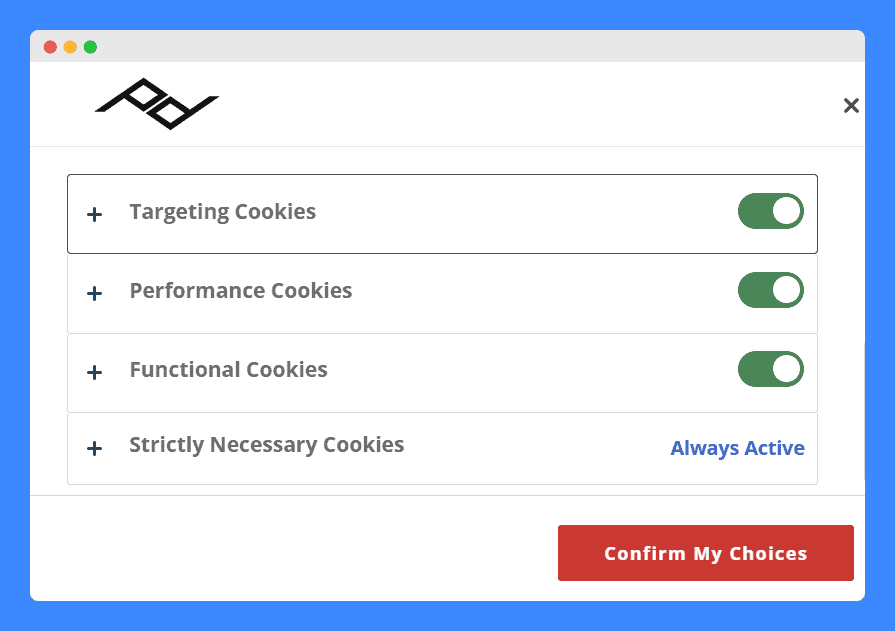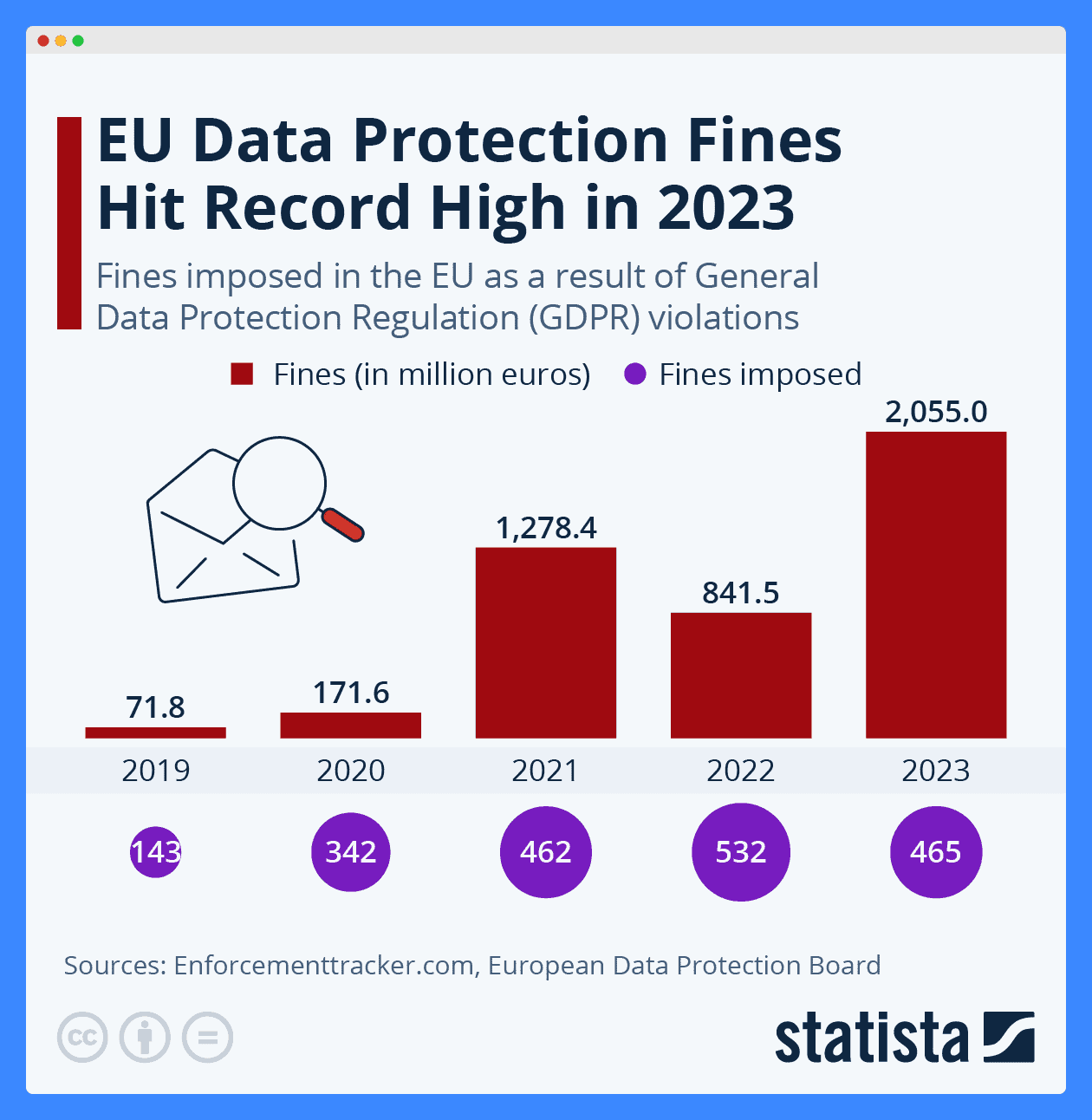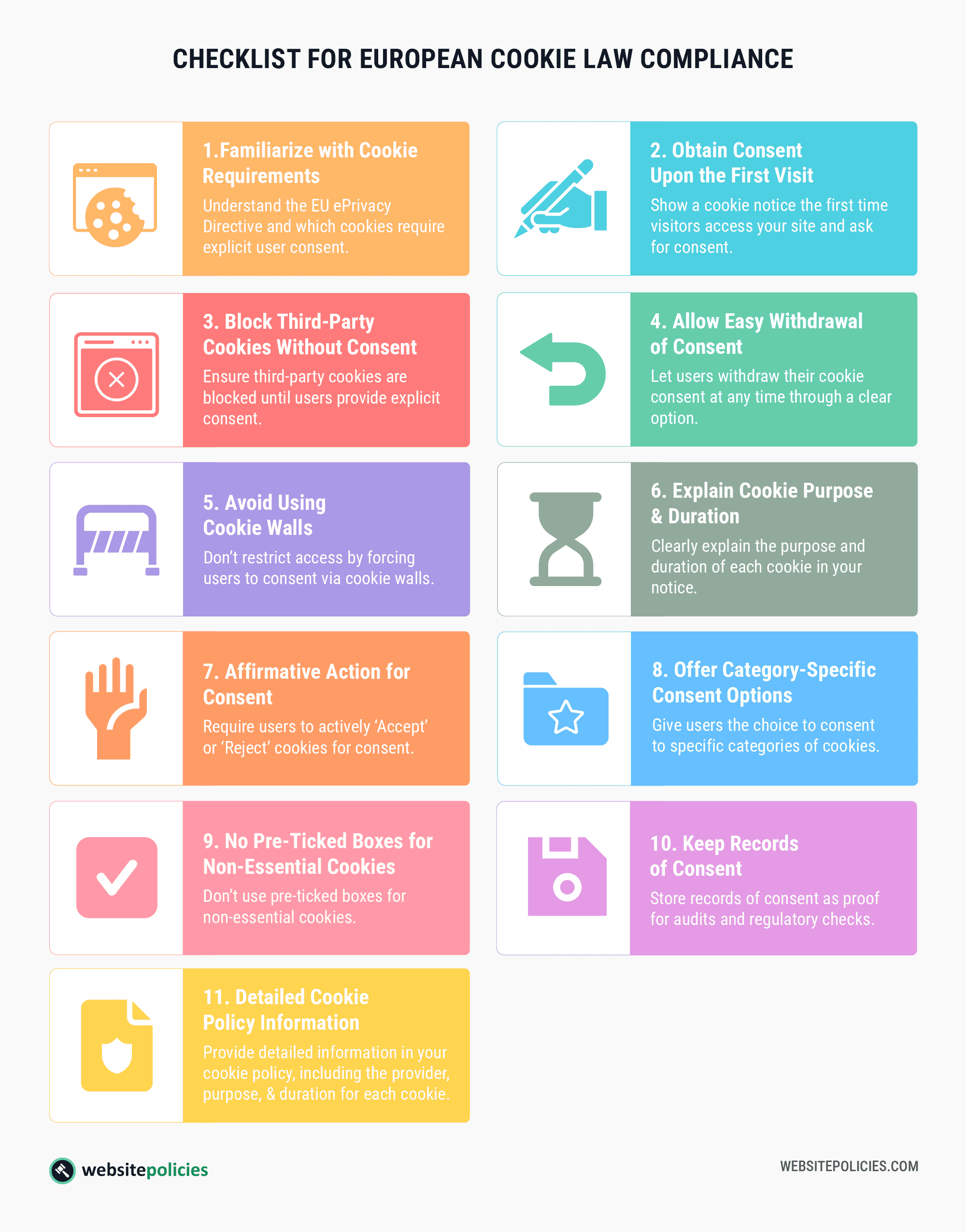Ever wondered what happens behind the scenes when you visit a website and see a pop-up asking for permission to use cookies? That’s the cookie law in action.
Cookie law refers to a set of laws that regulate the use of cookies to protect your privacy. Now, when you run an online business, knowing about these laws becomes even more crucial.
You see, cookies are small text files that remember logins, gather browsing behavior, and store the personal data of your website visitors. But before you can use them, you need to get clear cookie consent.
To give your business a clear advantage, we’ll talk about the specifics of these laws and give you practical tips to ensure compliance.
- If you’re targeting users globally, tailor your compliance strategy to meet diverse regulatory requirements.
- Use a clear consent banner to make it easy for users to manage their cookie preferences on your site.
- Regularly update your cookie policy and consent practices to keep pace with data privacy laws across different regions.
Table of Contents
PRO TIP: Don’t waste your time and take the guesswork out of the legal jargon with this personalized cookie policy generator trusted by over 200,000 businesses.
What Is the EU Cookie Law?
What is Cookie Law Europe? The term Cookie Law is the commonly used term to refer to the ePrivacy Directive. Essentially, this set of data privacy regulations requires websites to get consent from users before storing cookies on their devices.
Specifically, Article 5(3) of the directive mandates the informed and controlled processing of personal data.

In the context of cookies, this means that users must actively consent to their use before they are stored or accessed, and they must be allowed to refuse them. However, there are exceptions where consent is not required, like for strictly necessary cookies.
This ePrivacy regulation also aligns closely with the General Data Protection Regulation. For example, as underlined in the GDPR, cookie consent must be: clear, informed, and freely given.
Understanding laws like the GDPR and EU Cookie Law makes you better equipped to manage user consent effectively. More than compliance, it can help users trust your business more.
Does the UK Have Cookie Laws?
Yes, the UK has cookie laws. While no longer part of the European Union, it has retained many of the EU’s data protection laws, including those related to cookies.
One common cookie law UK is the Privacy and Electronic Communications Regulations (PECR). This is essentially the UK version of the ePrivacy Directive and is the primary legislation governing cookie use in the country.
Like the cookie law GDPR in the EU, the Data Protection Act 2018 also sets out principles for processing personal data lawfully, securely, and transparently.
In short, the UK’s website cookie law requires websites to obtain consent from users before placing cookies on their devices and to inform users about the cookies that are placed.
Does the US Have Cookie Laws?
No, the US does not have specific US cookie laws like those in the EU. Instead, it has various state-specific data privacy laws that address aspects of cookie usage as part of broader data protection measures.
- CCPA (California Consumer Privacy Act): This California cookie law mandates that businesses disclose data collection practices. It also gives Californians the right to see all the information a company has saved on them and a full list of all the third parties that data is shared with.
- CPRA (California Privacy Rights Act): An extension of CCPA, this act introduces more stringent data protection rights and further clarifies consent requirements around data collection.
- CDPA (Virginia Consumer Data Protection Act): This requires consent for processing sensitive data and allows consumers to opt out of data processing for targeted advertising.
- CPA (Colorado Privacy Act): Similar to Virginia’s CDPA, it offers consumers the right to opt out of data processing and gives additional protections regarding sensitive data.
- CaloPPA (California Online Privacy Protection Act): This act requires websites to prominently post a privacy policy that explains what information is being collected (through cookies) and how it is being used.
- COPPA (Children’s Online Privacy Protection Act): This act specifically targets the online collection of information from children under 13. It regulates how entities can collect and use children’s data.
While there are no comprehensive federal laws specifically governing cookies in the US, several major cookie laws like the California Consumer Privacy Act (CCPA) and the California Privacy Rights Act (CPRA) have been enacted at the state level.
As an online business owner myself, I’ve learned early on the importance of staying informed about these laws, especially since they can vary significantly in their requirements and penalties.
My advice is to regularly review the relevant cookie laws in the US states where your business operates or has customers. Additionally, having a clear cookie policy in place will demonstrate your commitment to data privacy and compliance.
Who Needs to Comply With the Cookie Law?
The web cookie law will apply to any website or app that uses cookies to collect or store user data. This means that virtually all online businesses, regardless of size or industry, will need to comply with cookie laws. These include:
- Online retailers
- Content publishers and blogs
- Educational platforms
- Healthcare portals
- Social networks
- Digital advertising services
These regulations apply not just to businesses within the EU, but also to any website or app that targets EU residents. So, if you’re offering services, shipping products to EU countries, or marketing in European languages, you need to comply with the cookie law.
Even if your business is based outside the EU, as long as you have visitors from the region, these laws affect you.
However, if your website does not target EU residents and primarily serves non-EU countries, your compliance requirements might be different. Nevertheless, it’s still wise to be aware of and respect the data privacy expectations of all your users.
If cookies are used on your platform to enhance the user experience, track analytics, or personalize advertising, it’s in your business’s best interest to adhere to cookie law requirements.
How Do You Comply With the Cookie Law?
The specific requirements may vary slightly depending on your location. However, there are some general steps you can take to ensure your website is compliant.
As someone who has gone through this process, here’s how I made sure my online store stays on the right side of cookie regulations:
1. Audit Your Website for Cookie Use
Start by conducting a thorough audit of your website to identify every cookie that’s being used. This involves cataloging each cookie, understanding its purpose, and determining how long it stays active on a user’s device.
In my case, I use tools like Cookiebot, OneTrust, or Ghostery to scan my website and catalog each cookie automatically. These tools can also help me identify any third-party cookies that may be tracking my visitors without my knowledge.
2. Update Your Cookie Policy
Comprehensive cookie policies inform users about how their data is being handled, a crucial aspect of cookie compliance. It should outline the types of cookies you use and the functions they serve.
If you are unfamiliar with drafting such policies, you can use a cookie policy template you can tailor to suit your needs. This approach not only makes the process more manageable but also guarantees that you cover all the legal bases.
3. Implement a Cookie Banner
The purpose of a cookie banner is to inform new site visitors regarding cookie usage as soon as they enter your website. Here’s an excellent example of that from PopSockets:

4. Obtain Explicit Consent
Unlike implied consent, which assumes approval through a user’s continued use of the website, explicit consent requires direct action from the user.
This means that users must actively take positive action, such as clicking the “Accept” button like in the example earlier or toggling a consent switch to indicate their agreement to the use of cookies.
It’s also important to remember that pre-checked boxes or other forms of implied consent are often considered legally invalid. This approach ensures that the user consent for cookies is clear and unequivocal.
PRO TIP: Don’t set non-essential cookies until the user has consented. Do this by setting your site’s cookie management tool to delay the activation until after consent is given.
5. Provide Access to Preferences via Cookie Manager
You can allow users to easily modify their cookie settings with user-friendly cookie management tools like CookiePro or TrustArc.
For years, I’ve been using these tools to inform my site visitors about the purpose of each specific cookie. This way, they can make informed decisions about whether or not to allow them.

For example, if a user allows a session cookie, the website will remember their actions as they navigate different pages. On the other hand, if they reject it, then they might find their browsing experience less seamless. Ultimately, it was a decision they made.
6. Regularly Update Compliance Practices
Laws evolve and new guidelines may be introduced. This is why it’s important to make sure you stay aligned with the latest cookie rules and regulations.
To do this, perform regular reviews and updates on your cookie policies, consent mechanisms, and data handling processes. In my experience, it’s best to do this annually or whenever there are significant changes in your business practices.
What Happens if You Don’t Comply With the Cookie Law?
Failure to comply with cookie law can lead to significant consequences, as it breaches regulations designed to protect user privacy. Here are three primary consequences for non-compliance:
Financial Penalties
Regulatory bodies can impose hefty fines on organizations that fail to obtain UK GDPR cookie consent or equivalent approvals. These fines can be substantial, often calculated based on a percentage of the company’s annual turnover.
In fact, regulatory bodies enforcing the GDPR are taking violations more seriously than ever. Just last year, they imposed a record high of approximately €2.1 billion in fines.

These numbers are a stark reminder of the importance of adhering to cookie laws and broader data protection regulations to avoid similar costly penalties.
Damage to Reputation
Handling customer data without prior consent from visitors can make them lose trust in your business. This can lead to a decline in user engagement, lower website traffic, and a potential decrease in sales as users seek more trustworthy alternatives.
In this regard, I recommend a proactive approach. I make sure to maintain transparency by having not only a clear cookie policy but also a solid privacy policy readily accessible on my website.
By openly communicating how we handle customer data and how they can control their privacy settings, we’re able to build trust and reassure our customers.
Legal Challenges
Non-compliance to cookie laws can attract legal repercussions from individuals or groups. These can be costly and time-consuming and may divert resources away from business operations.
PRO TIP: Implement a regular compliance audit schedule to catch potential legal issues early. Engage a data protection officer to navigate complex privacy laws effectively.
EU Cookie Law Compliance Checklist
For compliance with the European Cookie Law, make sure you cover all these bases:

Frequently Asked Questions
Do US websites need to comply with the EU’s cookie law?
Yes, US websites must comply with the EU’s cookie law if they target EU residents. They need to meet the requirements for cookie consent and transparency.
Are there cookie laws in Australia?
Yes, cookie law in Australia exists under the Privacy Act. Websites must inform users and obtain consent for cookies.
Are there cookie laws in Canada?
Yes, Canada has cookie laws under PIPEDA. Websites must actively inform users and secure their consent for cookies.
What types of cookies are regulated under the cookie law?
All types of cookies that collect personal data are regulated under the Cookie Law. This includes both session and persistent cookies.
What steps can I take to ensure my website is fully compliant with the cookie law?
To ensure compliance, audit your site for all cookies used and update your cookie policy. Implement a clear cookie consent banner.



